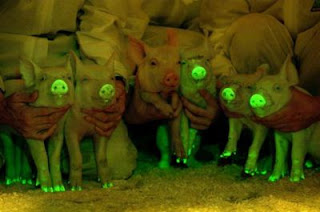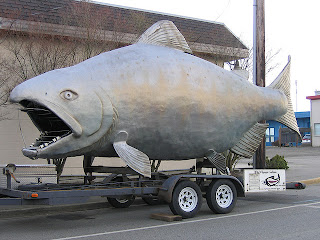 |
| My Dad, unmodified |
Californians are considering a proposition to require genetically modified foods to be labeled. Such a label might read “Warning: Contains Genetically Modified Organisms.” Monsanto, the world’s largest GMO producer, is agin it. The corporation believes this will have an adverse effect on sales. And it probably will, at least more so than if the label read “Boy Howdy! Genetically Modified Organisms.”
Critics of the proposition believe the labels might lead consumers to reject GMO products without having any understanding of their environmental and economic benefits. There is something to this. People might indeed veer away from the stuff even if it is completely safe. It is true that many people react viscerally rather than investigating. For instance, I automatically, without further review, discount any proposition made by a Republican, but it does not follow that all Republicans are unworthy of support. No. They are unworthy of support because they are short-sighted, profligate, womb-invading planet pirates with cash-encrusted pockets the size of entire countries.
So what is genetic engineering? It is the deliberate manipulation of a living genome by the insertion or deletion of a gene. Deletions are dicey: the sucker is still in the hard drive somewhere and ignorance of this fact will dog you all the way to divorce court. But usually genes are inserted instead, and usually across species. Most often a bacterial gene is inserted into plant DNA, but it could totally be a squid or something. The gene can be inserted by attaching it to a virus and sending it on what amounts to a guerrilla mission, or tiny little particles can be fired into their targets with something called a “gene gun.”
This process has resulted in plants that grow their own insecticides or are impervious to our own herbicides, or–in a breakthrough for the fossil-fuel industry–tomatoes that remain sullen and leathery and can be transported over huge distances until they arrive at their destination markets to “ripen,” which is the industry term for turning reddish.
Animals too have had their genomes twiddled with. Using a “gene howitzer,” a goat has been engineered to produce incredibly strong spider silk in her milk, which is suitable for body armor and other military uses; pigs have been grown that glow green in the dark.
Ask anyone who has ever suffered that common nightmare about the roving band of bullet-proof goats wearing night-vision hoggles: this has the law of unintended consequences written all over it. It should sound familiar. Settlers in Australia thought they were bringing in a tasty touch of home with their rabbits, and now the entire country’s topsoil has been replaced by bunny fur. We’re no good at this.
It isn’t that we can’t aspire to greatness. If the gene that persuades songbird chicks to poop in their own little transportable baggies could be shot into urban dogs, the world would be a better place. Likewise might we be better off if the pig-snout development gene could be inserted into mosquitoes so that they grow blunt proboscises, and are forced to queue up at the Red Cross for charity blood boxes. But things get away from us. The concentration of logy mosquitoes might then lead to localized populations of rotund chickadees that can barely get off the ground and threaten the eyesight of small urban dogs. The birdhouse industry will falter during a retooling phase and new markets will spring up to produce designer chickadee deflectors for pugs. It’s hard to predict, or control.
If you look around at nature, you’ll find that everything is pretty much the way it’s supposed to be. That’s not so much because any particular deity wants it this way. It’s that if it were supposed to be another way, it would be. Which is not to say things remain static. Stuff happens. Little stuff, big stuff. Lightning strikes a tree and creates new housing opportunities. Rocks fall out of the sky and all the dinosaurs pack it in. Life is opportunistic. If you pull a peg out of the wall, something’s going to happen. Either something will burrow into the hole and lay eggs, or the wall will come down on top of you.
So without doing a lot of research, I am on the distrustful side of the genetic engineering development. We’ve done nothing but tinker since we crept out of the gorge and danced on the savannah. And I don’t think our record of so-called mastery is very good.
But I am excited about the possible introduction this year of a fast-growing salmon. Throw in a baguette the size of a missile and Jesus will be on board with it, too. I know just where they’ll put it. Right off the Pacific into the mighty Columbia, which I can see from my house. Any lesser river and the poor bugger will scrape his sides on the banks.




I'm with you on this one Brewster. For sure all we do is fleck things up. When trying to describe the law of equal and opposite reaction to people who without a clue I use the analogy of a balloon… push you finger into one side of the balloon and the whole thing expands, not just the part opposite your finger. "See, that's how it works nit wits," I always say. Just because you can't see the reaction doesn't mean it isn't there. But alas, it's wasted on Republicans.
And in the case of GMOs, sometimes the balloon explodes.
Gee, I guess you're probably a Democrat? Me too! Every word you said about those Republicans is unfortunately true. I don't eat GMO foods anyway. If it says "organic" on it, it's not GMO. Those glowing pigs are really spooky looking.
Actually, the primary complaint against GMO agriculture is that it is contaminating other fields, including organic ones. I am not of a scientific bent, so Murr will have to explain how this happens. I think it has something to do with wind or something complicated like that. But, essentially, if GMO continues, there will be NO unaltered plant life. At least, that's what I've read.
What was your first clue I'm a Democrat? An imperfect bunch to be sure, but lordy lordy, at this point it would be hard to find a philosophy more antithetical to my own than the one the Rs actually espouse, at least this week.
Oh yeah, SC, and what could go wrong with penning in a super salmon? No way that will get loose, huh?
There is a sort of karmic rightness about a salmon big enough to eat sea lions.
And you know, in a way we have been doing genetic engineering for centuries. It's called selective breeding. Corn is just grass that has been selectively engineered to the point where it can't grow wild anymore. (No way to get the seed out of those husks.) The friendly neighborhood wolf has been engineered to be everything from Mastiff to teacup chihuahua. Heck, we do selective breeding in our own species. Tall dudes and smart dudes get all the hot babes.
Roxie has a good point. I guess the real question is, where do we draw the line? We do selective breeding in animals (and maybe inadvertently in humans, as she points out), but we draw the line at cloning, for example. I think the difference between selecting for better varieties of corn, etc, and GMO is that, with the latter, we are crossing species (or whatever one calls them in the plant world) that shouldn't be crossed. I don't think anyone objects to crossing plums and peaches, say (except maybe their own families, as fruit can be quite clannish); but when it comes to animal genes or whatever in plant life, that just seems different.
Really, I've just stretched my scientific knowledge as far as it will go. Can you tell I'm supposed to be working?
Crossing plants and producing sterile hybrids does have an effect on the entire web of life. When you replace simple flowers with the developed "improved" flowers, you often take away food from the insects that in turn, support some the birds and the mammals. This is because the bees and butterflies can no longer squeeze past the too numerous petals to reach the nectar and pollen, or that the plants don't even make it – it got breed out of them in the process of making prettier plants.
However if you produce a mule from cross breeding a donkey and a horse, you have an animal that is very tough and was useful to the American army, before vehicles were invented, and farmers.
Adding genes from wildly different organisms that result in the plant producing toxins against an organism that eats it may result in other necessary organisms being harmed. Anything that eats that plant or helps to fertilize it is at risk.
There's other stuff too. Some of our GMOs are designed to be resistant to our own herbicides, so we can use more herbicides, and that affects everything else; and cross-pollination has produced superweeds that can't be controlled.
There's a lot of concern that ingesting GMO proteins is killing off bees. But I supposed we can fix all that by paying Mexicans a dollar a day to pollinate flowers with Q-tips. So no worries.
Gardners practice cloning all the time. They make starts of existing plants.
I'm with Murr on this, though. I want to be able to decide what kind of strawberries I'm buying, even if the ones made of styrofoam that they strip mine down in Texas DO hold up better in shipping.
What a great reminder that we should not be supporting the genetic modification of plants. And we definitely need to know if we are in supporting more and worse modifications.
Plants modified to produce their own BT have been shown to kill Monarch caterpillars and reduce learning in bees, possibly leading to the demise of the hive
The history of most of our chemical wars against "pests" is that we harm more of the organisms we consider "good", including ourselves, than we hurt the target species, which often becomes immune to the toxin and becomes a super bug.
Both colony collapse disorder of the European honey bee (which together with our disappearing native bees account for the production of 1/3 of our food) and the widespread lowering of human male fertility can be traced to side effects of chemicals we use for other reasons, each not showing enough immediate side damage to be banned. And the proponents try to suppress any studies on long-term effects of the chemicals, and actually finding the effects has to happen many years later, when many organisms have been permanently harmed or killed.
Here is a link to one research paper on this topic: http://lamar.colostate.edu/~hufbauer/Articles/LoseyObrykHufbauer2004a.pdf
What you said. I don't think the widespread lowering of human male fertility is such a bad thing, though.
So true.
All of nature is a symbiotic relationship and we humans have no business fucking with it. Ever. Excellent way to bring home the point, Murr.
It IS hard to imagine how we think we can improve on all this, isn't it?
I don't know. I'm sort of grateful for the invention of penicillin, the polio vaccine, and such…
Also? Flushing toilets. That's a great improvement, in my opinion.
Not to mention international shipping. Coffee doesn't grow well around here.
I do not buy GMO foods. I buy foods grown or produced locally.
But think about the potential for GMO – do you think it is possible to alter the DNA of Republicans? Think of the possibilities…
GMRs. Aaaah.
Scary thought. Hasn't MerCyn ever seen Frankenstein? Or Jurassic Park? Those sort of innovations tend to come back to bite us.
I saw this and thought of you…
http://www.ravelry.com/patterns/library/poop
Sorry, but I couldn't help it.
Ladies and gentlemen, Tenna has sent me Crocheted Turds.
Takes the term "cro-shitting" to a whole new level.
A very interesting and sometimes funny post. Humans have only been around for 3-4 million years, a nano second compared to the lifespan of the Earth. The Earth hasn't really gotten around to noticing us yet but in time it will,and like that old TV commercial said: you can't fool Mother Nature.
Uh. The Earth is noticing. The Earth is getting ready to give us the boot. Too bad she'll take so many others with us.
Actually, the commercial said "It's not NICE to fool Mother Nature", which is even more to the point.
Sadder than sad, but I think, Murr, you are right about Earth being about to give us a serious case of population collapse. We are just soiling our own nest in millions of ways, many of them now fast acting.
Well, if I knew how to crochet I'd send you a crocheted crown and scepter. 😉
This whole GMO thing is so scary! Messing with interspecies genetics to make more money–frightening! I've also heard that eventually there could be no natural plants left. We already put so many chemicals in foods and everything we live with–just plain frightening!
I hope they pass the law that they have to declare themselves. It might hurt business? It SHOULD hurt their business!!
Any Californians care to weigh in?
I am a Californian and, by God, I will vote for that warning label, not that it will do much good. ( as with most of my votes it seems)
I am definitely in favor of Genetic Modified Republicans though and will even give money to that cause. I do want to have some say in the modifications……..though I guess almost anything would be better than the ones we've got now.
Oh Goody! Lo is voting. California is a big deal and whatever passes there that affects commerce tends to tilt the whole boat.
How do you like the wheat , oatmeal or rice these days? All grains are altered. Maybe thats what's adding to our weight gain issues.
So how do we revert?
Voters have no say do they???
I eat tons of oatmeal and I revert at least once a day.
Science has done a few good things, like eradicate polio and some other diseases, for countries that can afford it. At least where there are Republicans that can line their pockets with the profits.
Ooo, ALMOST eradicate polio. I think there are still a few cases here and there. Am I wrong? Oh, if only there were some magic thing where we could look things up and find out the answer immediately.
I was working as a lowly lab tech at Harvard Sch of Public Health when we were watching the weekly report on smallpox. One week there were six cases in the world, the next week there were two, the next there were 102. The magic zero did happen though.
Oh, yes, there are cases of polio still lurking about. Scare of sterilization. But that's another issue — east vs the west. We've come very close but then the rumor starts up again that the West (read US) is trying to sterilize us. Most of these countries are Islamic. http://www.polioeradication.org/Dataandmonitoring/Poliothisweek.aspx
Pakistan has just halted its polio vaccination program because Osama bin Laden was located by a doctor, working for the US, whose cover was a vaccination program. Not surprisingly, Pakistan has one of the highest polio rates in the world. (By the way, isn't Pakistan supposed to be one of our allies?)
Speaking of your basic unintended consequences.
I'm afraid I don't think much of mankind's record on using knowledge wisely, either, Murr. It can be downright depressing if you think about it too long. There are many good and wise people, but it seems they are outnumbered by the others, the ones who are lacking in intelligence, power hungry, or have no conscience. Or some combination of the above.
That's why I love humour. It's one way to deal with the frustrating crap. And it's one way to address it too. Hey! sorta like you do here! 🙂 for which I thank you.
Humor's in my genes, which are getting lower and lower-slung all the time. I can't take the world without it. I'm not really very optimistic but I can't spend much time with that attitude.
If I had my druthers, I druther not have GMOs in my milk, and other stuff. I understand the science. The big thing about GMO is the money you make on selling the seeds, and other things. Companies wouldn't be pushing this if there weren't $$$ in the process.
Sigh.
Fact. They like to say they're feeding the world, but the problem with feeding the world has never been having enough food. It's getting it to the people. It's a political problem.
If there the word hubris didn't exist to describe our zombie-like drift towards GM, it would have to be invented.
I must say, though, if someone finds a way to get the Scottish midge to back off, I'm listening.
Really? They sound so dang cute. With their little tams and all.
Hey Murr! They grow GM crops here in Cambridge. And they're a few yards away from non-GM ones. Apparently there is no danger of cross-pollination. I hope someone told the bees. Indigo x
Shoot, one little hitch in their waggle-dance and it's all over.
I do not think those scientists who are doing all this genetic engineering have ever thought ahead as to the "what ifs" to know whether the end result is really worth it. Sometimes I think they do it just because they can and never consider the future results. Or maybe they just all have big egos and want to make it "bigger and better" in their own eyes. Those little bees are just one forecaster. Now if they wanted to work on making a cute, younger looking body to put my brain and personality into, I would not complain! LOL
Oh the result is worth it. That is some major bucks there. Oh, you meant something else?
Monsanto is already feeding us all numerous GM foods that are not labelled as such. Google Monsanto and watch what pops up! It'll make you want a stiff drink of good old fashioned single malt scotch… As for the Salmon, some clueless twit released Snakeheads into the Potomac River, and (since they have no native predators here) they have been thriving and upsetting the natural balance of the ecosystem here. As was previously noted: It's not nice to fool Mother Nature! Elaine
Worse, it's not possible to fool Mother Nature. She can't be bought off.
Oh, and sorry about the snakeheads.
I'm very curious about these glow in the dark pigs. Was this done for night time football?
Or late barbecues…now you've made me want to go find out. Back soon.
Genetically modified Republicans … ummmmm!
Once again, inspired and spot on -"They are unworthy of support because they are short-sighted, profligate, womb-invading planet pirates with cash-encrusted pockets the size of entire countries." Brilliant!
Just our luck we'll create GMRs and they'll overtake the regular people after pollination by Lobbeeists.
You totally plagiarized this from Charles Darwin. He put pictures of glowing pigs up on the Internet, like, a hundred years ago.
Well plagiarized, though, my friend.